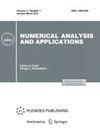抛物整微分方程优化控制问题的新后验误差估计值
IF 0.5
Q4 MATHEMATICS, APPLIED
引用次数: 0
摘要
摘要 本文为抛物线整微分最优控制问题的线性有限元逼近提供了一种新的后验误差分析。状态和共状态用分段线性函数近似,控制变量用变分离散法离散。我们首先定义了数值解的椭圆重构,然后讨论了所有变量的后验误差估计。本文章由计算机程序翻译,如有差异,请以英文原文为准。
A New A Posteriori Error Estimates for Optimal Control Problems Governed by Parabolic Integro-Differential Equations
Abstract
In this paper, we provide a new a posteriori error analysis for linear finite element approximation of a parabolic integro-differential optimal control problem. The state and co-state are approximated by piecewise linear functions, while the control variable is discretized by variational discretization method. We first define the elliptic reconstructions of numerical solutions and then discuss a posteriori error estimates for all variables.
求助全文
通过发布文献求助,成功后即可免费获取论文全文。
去求助
来源期刊

Numerical Analysis and Applications
MATHEMATICS, APPLIED-
CiteScore
1.00
自引率
0.00%
发文量
22
期刊介绍:
Numerical Analysis and Applications is the translation of Russian periodical Sibirskii Zhurnal Vychislitel’noi Matematiki (Siberian Journal of Numerical Mathematics) published by the Siberian Branch of the Russian Academy of Sciences Publishing House since 1998.
The aim of this journal is to demonstrate, in concentrated form, to the Russian and International Mathematical Community the latest and most important investigations of Siberian numerical mathematicians in various scientific and engineering fields.
The journal deals with the following topics: Theory and practice of computational methods, mathematical physics, and other applied fields; Mathematical models of elasticity theory, hydrodynamics, gas dynamics, and geophysics; Parallelizing of algorithms; Models and methods of bioinformatics.
 求助内容:
求助内容: 应助结果提醒方式:
应助结果提醒方式:


